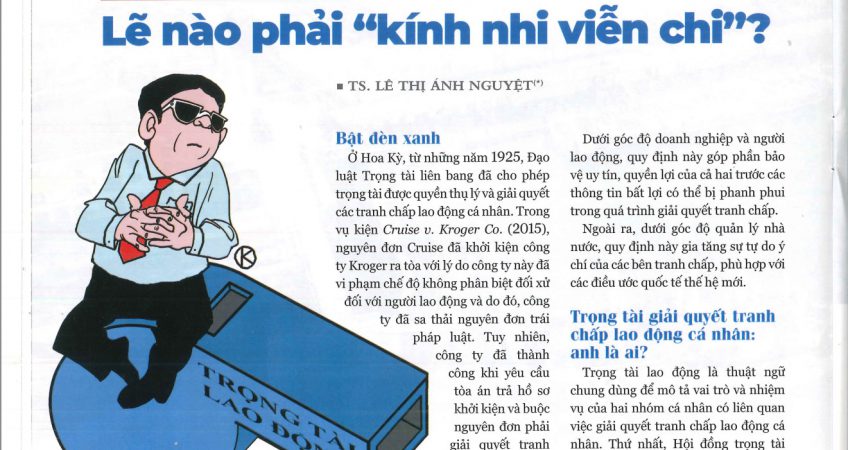
Labor Arbitration Should Businesses “Kinh Nhi Vien Chi”?
Since January 1, 2021, the Vietnam Labor Code (“Labor Code“) 2019 has enabled enterprises and employees to settle their individual labor disputes by labor arbitration (“Labor Arbitration” ). This is expected to be an impartial and coherent mechanism and at the same time, private enough to balance the legitimate rights and interests of the parties. However, the labor arbitration mechanism still has remained some unsolved problems. This article will analyze the successes and limitations in order to contribute to “release defilements” for businesses and employees.
For the first time, Vietnam turned the green light to the labor arbitration to settle individual labor disputes
Unlike the United States, since 1925, the Federal Arbitration Act has given arbitrators the right to accept and resolve individual labor disputes. In fact, in the Cruise v. Kroger Co. (2015), when fired, plaintiff Cruise sued Kroger Company to court on the grounds that it violated the principle of non-discrimination against employees and, therefore, the company unlawfully discharged the plaintiff. However, the company succeeded in asking the court to return the lawsuit and forcing the plaintiff to settle this dispute by arbitration because the labor contract had incorporated the arbitration clause so that the labor arbitration had the jurisdiction to resolve the labor relationship between the parties.[1]
In Vietnam, with the Labor Code 2019 (“Labor Code”) 2019 and Decree 145/2020/NĐ-CP detailing and guiding the enforcement of a number of articles of the Labor Code 2019 regarding working conditions and labor relations (“Decree 145“), Vietnam, for the first time, allowed the competent labor arbitration to have the authority to resolve individual labor disputes “The following agencies, organizations and individuals have the competence to settle individual labor disputes: (1) labor mediators; (2) Labor Arbitration Councils; (3) The People’s Court.”[2]Accordingly, an individuallabor dispute means a dispute over rights, obligations and interests among the parties during the establishment, execution or termination of labor relation.[3]
From the perspective of businesses and employees, we believe that this regulation will also contribute to protecting the reputation and interests of both parties against detrimental information that can be exposed in the process of resolving individual labor disputes. For example, if the court resolves labor disputes where employees are fired by theft, and/or sexual harassment … then the image and reputation of both corporations and employees in these disputes will be abused, smeared. On the corporation side, the images of an individual sexually abusing employee will also more or less have affected those of the company and, from there, affected the legitimate rights and interests of other employees who have been working at the same corporation because the court resolves the dispute on the principle of publicity for a long time through many different levels of first – instance and appellate trial.
In addition, from a state management perspectives, we find that this provision is also consistent with the newgeneration international treaties because this will haveincreased thefreedom of expressionof the disputing parties. In the context thatmore and more foreign individuals and organizations haveinvestedand workedin Vietnam, labor arbitration will also contribute to increase the confidence of foreign individuals and organizations about the harmony of the laws of Vietnam with the laws of the countries in which they hold nationality and/or are established.
Labor arbitration to resolve individual labor disputes: Who are you?
According to the Labor Code 2019, labor arbitration is a general term used to describe the roles and duties of two groups of individuals involved in resolving individual labor disputes. Firstly, the labour arbitration Council includes no more than 15 arbitrators (including 05 labor arbitrators nominated by the provincial labor authority; 05 arbitrators nominated by the provincial trade union and At least 05 arbitrators nominated the representative organizations of employees in the province.).[4]And, secondly, the arbitration tribunal directly resolves individual labor disputes (including 01 or 03 arbitrators).In general, labor arbitrators must be Vietnamese citizens (Clause 1), can be civil servants or officials but in no case they could be judge, prosecutor, investigator, executor or official of a court, the People’s Procuracy, investigation authority or judgment execution authority.[5]These arbitrators operate on a full-time or part-time basis, depending on the position of the arbitrator as president, secretary or member (Article 101 of Decree 145). Regarding salaries and wages, Decree 145 also recognizes that arbitrators receive salaries from the state budget “each day of studying case files, collecting evidence and attending meetings to settle labor disputes as assigned shall be received an allowance of 5% of the average of applicable monthly minimum wage of all regions for employees working under labor contracts as stipulated by the Government from time to time or higher if the People’s Committees of provinces may propose t to People’s Councils of the same provinces within the budget of their provinces”.[6]Regarding the working hours, Decree 145 further explains that arbitrators will be facilitated by the agency, unit and organization where they are working to provide an appropriate time to participate.
In our opinion, the above characteristics of labor arbitration according to Vietnam labor lawshave changed the ordinary nature of arbitration. Specifically, in terms of arbitration fees, arbitrators always receive arbitration fees from theexpensesof the disputing parties, not from the state budget, even though operating as a member of a center arbitration or acting on an individual’s behalf for a certain incident (also known as ad-hoc arbitration). In addition, regarding the choice of arbitrators, Vietnam labor lawshas limited the right to appoint labor arbitrators from individuals “empowered” by Vietnamese state agencies, rather than allowing the parties to automatically appoints arbitrators based on the disputing parties’ perception of the arbitrator’s capacity and qualifications that they might think suitable for the dispute content andtheirfinancial ability. This can be beneficial for the employee because employeemay for a number of reasons, such as financial constraints, especially beingfired or being disciplined to prolong the payroll period, will may accept to appoint one or more members of the arbitral tribunal from the list of pre-selected “civil servants,officials” without payingthe arbitration fee. However, through receiving salaries from the state budget, in some cases businesses may worry that the arbitrator is an extended arm of state agencies. If so, businesses argue that they will need to be given more opportunities to implement their right to freedom to conduct abusiness including the right to choose more independent and objective dispute resolvers. In other words, if enterprises do not want to choose civil servants orofficials which areon state payrollas Labor Code 2019 and Decree 145request, what should enterprises do? Viet Nam’s labor laws have been silentin this regard.
If the dispute resolution decision of the labor arbitration is not enforcedthen the parties will bring it tocourt: Why should wastemore time and costs?
It should be added that, just like commercial arbitration, labor arbitration has no natural jurisdiction and when an arbitration agreement is reached, it excludes the jurisdiction of the court. In particular, labor arbitration also has the authority to resolve individual labor disputes when the parties reach an arbitration agreement “The parties are entitled to, by consensus, request the Labor Arbitration Council to settle. When the Labor Arbitration Council settlethedisputes,the parties must not simultaneously request the courts to settle the disputes” (Article 189 Labor Code2019).
However, Vietnameselabor lawshavedeveloped a labor arbitrationregime that isvery different fromthe usual nature of arbitration; it is, in case a disputing party fails to comply with the decision of the arbitral tribunal, the parties are entitled to bring the case to court(Article 189 Clause5 Labor Code 2019). So, the question now is why the parties do not enforce the dispute settlement decisionissued by labour arbitration? And, when the labor arbitration has finished,but the parties havenot executedand transferred to the court, what will the jurisdiction of the court now be? Wouldthe court re-resolve all aspects of individual labor disputes that the labor arbitration hadresolved? This is also not explicitly stated in the Labor Code 2019 and Decree 145.
As such, Labor Code 2019 and Decree 145do not create theappropriate mechanisms for decisions on dispute resolution of labor arbitration to be enforced. The parties of theindividual labor dispute have no right to request any governmental agency to enforce the dispute resolution decision of the labor arbitrator. Enterprises and employees are just supposed to waitfor labor arbitration to issue notices of acceptance of disputes; prepare relevant documents and evidence to participate in meetingsessions with labor arbitration and, after that, continue to wait and see if the arbitration settlement decision is enforced, if it is not enforced, they have toinitiate further lawsuits in court? In our opinion, this is unreasonable, it will take time and effort of enterprises, employees and in particular, will also destroy the enthusiasm of the human resources department in the state agencies that “legalized” the humanity mechanism of labor arbitration for individual labor disputes.
Therefore, Vietnam should have a circular guiding the implementation of Decree 145 in the direction of adjusting the enforcement mechanism of the dispute settlement decision of labor arbitration.For example, supplementing the rights of individual labor dispute parties to request judgment enforcement agencies to enforce decisions on settlement of individual labor disputes issued by competent labor arbitrations to limit cases where the parties do not enforce them, but wait for lawsuits to be initiated in court. In particular, Vietnamese labor law should inherit other important features of commercial arbitration such as the obligation of the court not to re-settle the entire dispute if the arbitration has accepted and settled. Instead, the court should just stop at the consideration of whether the labor arbitration has complied with the order, the proceedings or seriously violated this order and procedures and if the labor arbitrator violated the proceedings, the court shall cancel the arbitral award. In any case, if the labor arbitrator already settle the dispute, the court shall not settle this individual labor dispute entirely from the beginning.
If enterprises and employees must untangle by themselves, why don’t we just “kinh nhi vien chi”?
To a certain extent, the Labor Code 2019 and Decree 145 have shown Vietnam’s efforts to encourage businesses and employees to use labor arbitration to resolve individual labor disputes, especially for Disputes are very sensitive, easy to “tinh ngay ly gian”[7]such as sexual harassment, stealing corporate property. However, if we do not solve the problem as analyzed above, we are concerned that Vietnam’s efforts to protect businesses and employees from irony, “bad news has wings” situation in individual labor dispute are not enough to convince enterprises and employees to stand up and troubleshoot for themselves. At this time, how can we stand to see enterprises and employees choose “kinh nhi vien chi”[8]to face labor arbitration institutions?
* Ph.D., Partner, Lac Duy & Associates.
[1]Cruise v. Kroger Co. (2015).
[2]Article187.
[3]Article179.
[4]Article185.
[5]Article98 Decree145.
[6]Article103 Decree145.
[7]“Tinh ngay ly gian” is the Vietnamese idioms on the state of being innocent but having the evidence against oneself.
[8]“Kinh nhi vien chi” is the Vietnamese idioms on how people have reacted to things that they might think good but troublesome and they have chosen to keep away from it.


